Fragrant Source Inner Monastery
The last days of 2009
To my Bat Nha children,
I know that in these moments, you have to disperse to many places, and you cannot live together to practice as a monastic community anymore, but I trust that my letter will still reach you.
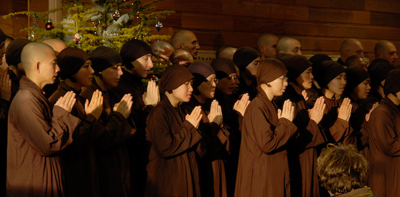
On Sunday 20th, 2009, brothers and sisters from the four Plum Village monasteries gathered to have a Day of Mindfulness. It has been six months that we had to organise days of mindfulness outside the Dharma Cloud Temple of Upper Hamlet, because the meditation hall was under construction. Last Sunday, the Still Water meditation hall has been finished, and thus this was the first time that the community could use the meditation hall again. The new meditation hall is very large and beautiful, a lot larger and more beautiful than the old meditation hall.
The monks and lay men of the Upper Hamlet worked together to design and build this meditation hall. They worked as a Sangha, and during six months, they had the opportunity to cultivate and expand their brotherhood. Looking into the meditation hall, everyone can see the Sangha and their brotherhood. Each roof tile, each floor tile, each window frame carries remnants of laughter, the look, the hands and drops of sweat of each person in the community. The brothers from the Foot of the Mountain Temple as well as the sisters from the New Hamlet and the Lower Hamlet also came to contribute a day of work every so often. The meditation hall is beautiful, but if we look at the meditation hall and we cannot yet see the brotherhood and sisterhood of the Sangha, then we do not yet see the meditation hall’s true beauty.
The theme of our Winter Retreat this year is The Art of Happiness, and the Sangha has just finished learning the Discourse on Happiness, Sakya Muni Discourse, and the transmission gatha of the Lieu Quan Dharma linage. The community practices the fifth mantra “this is a happy moment” very diligently, recognizing many happy moments of living and practicing together. The weekly monastic days organized at the Fragrant Stream Hermitage bring a lot of nourishment and happiness to the Sangha.
Everyone agrees that if we remember to practice the fifth mantra, it will be effective immediately. We only need to return to the present moment, to see that we (despite everything) are still more fortunate (than many people), then we can smile and say out loud: “This is a happy moment,” so that the people around us can also return to the present moment and be nourished by happiness like we are.
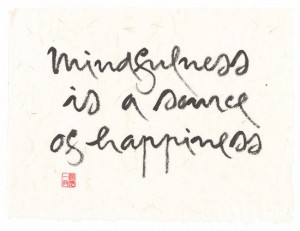
My children, Thay hopes that wherever you are, you can listen to the Dharma talks and practice according to the instructions given during this winter retreat. You need to be nourished by the Dharma Happiness and by your own practice, so that you can go through this difficult time of the Bat Nha Sangha. I have great confidence and trust in you. You have grown up quickly, thanks to the difficult events taken place over the last year, and I feel very pleased with your non-violent, loving and harmonious behaviors, from Bat Nha to Phuoc Hue Temple. History has witnessed that, with your loving and harmonious behaviors, you have planted and watered the seed of faith, understanding and love in many people’s hearts, including those who were hired to come to disturb and oppress us. This is the greatest success that we have accomplished; it is greater than any impressive stupa or temple building projects. On the eighteenth of this last December, Brother Trung Hai, Sister Giac Nghiem and a number of brothers and sisters represented the Bat Nha Sangha to go to Elysees to give a letter to the French president Nicolas Sarkozy, requesting that 400 monastic members of the Bat Nha Sangha may temporarily reside in France, in order to continue to practice as a community, until the Vietnamese government opens their heart to allow the Bat Nha Sangha to do so right on our homeland. In fact, according to the present laws, we have the right to live and practice anywhere in country, but it is not certain why we cannot benefit from these rights when we have not violated any laws, and when we only want to practice and guide others to practice within the laws of the land and of the Buddhist tradition. The national and international opinions, amongst Buddhists as well as non-Buddhists, are clearly supportive of us. Therefore, I believe that my children will not have to endure these difficulties for long.
Many friends have understood the essential needs to practice as a Sangha, so they were not happy when they heard that we must disperse, each person going his/her own way and practicing by himself/herself. The Buddhist tradition generally and the Plum Village tradition specifically do not accept this imposition. When a monk leaves his community, his spiritual life is dead, just like when a tiger leaves the mountain, it is killed. This statement is the ancient wisdom: If you practice without a community, your practice will wither and fade away, the way the tiger leaving his kingdom in the forest and mountain to go to the lowland, humans will kill him and take his skin. Our tradition is to go as a river. We cannot go as a drop of water. A drop of water if traveling alone on its way back the ocean, it will evaporate mid-way and never reach the ocean. Who amongst us do not know the song “We vow to be the river, not the small drops of water” written by Sister Hoa Nghiem? Therefore, dispersing the Sangha is the greatest ordeal to the spiritual practitioners. Spiritual practitioners must always take refuge in the Sangha Jewel. The Sangha is a community of practitioners. To build a Sangha brings a lot of merits and happiness, and to destroy a Sangha brings as much misfortunes and doom. I fear for those who have the unwholesome intention to destroy the harmony of the Sangha. This is the greatest violation amongst all violations. If the President of France allows the Sangha to reside in France, he will gain many merits and much happiness, won’t he, my children? Even if it is only a temporary stay.
Each one amongst us has three bodies: The Buddha body, the Dharma body, and the Sangha body. The Buddha body in us is still immature and weak, so it must be nourished by our daily practice. It is the seed of wisdom, compassion and loving kindness in us. It is our Buddha nature. The Dharma body is our daily diligent practice, which has the capacity to nourish and strengthen our Buddha body. The Sangha body is the community that we are taking refuge in, living together in order to practice. Our community is our body. If the community is dispersed, then the Sangha body no longer exists. The Sangha body is the environment that protects, nourishes and shines light on us. We have to take refuge in the Sangha body, and we have to see that the Sangha body is our body and whatever happens to the Sangha body, it is happening to us. Therefore, a monastic practitioner makes the vow to take refuge in the Sangha, never leaves the Sangha, just like the tiger never leaves its deep mountain and forest. Knowing that losing the Sangha is a great accident, you have done your best to practice non-violence in order to protect the Sangha, so that the Sangha does not fall apart. People with power in their hands need to understand this, and if they do not yet understand, we have to find ways to help them to understand it. Non-violence was the method used by the Buddha when his Sangha in the Vulture Peak was discriminated against and oppressed by the king Asajatu. King Asajatu intentionally tried to divide the Sangha and to destroy the Sangha harmony, and he suffered from a mental illness in the following years, that at the end, he had to come to the Buddha to ask for healing. You have learned this from the book Old Path White Cloud.
Mahatma Gandhi also applied non-violence to fight for India’s independence. He said: “Passive resistance, that is, soul force, is matchless. It is superior to the force of arms. Not the weapon of the weak.” This unforgettable statement by Saint Gandhi was made on April 29th, 1933. He also added that in order to succeed in his service for the country, a non-violent practitioner must be determined to keep the precepts. “To observe morality is to attain mastery over our mind and our passion. So doing, we know ourselves.” Saint Gandhi also shared his practice experience and struggle in very concrete terms: “After a great deal of experience, it seems to me that those who want to become passive resisters for the service of the country have to observe perfect chastity, adopt poverty, follow truth and cultivate fearlessness.”
During the entire time of his struggle for India’s independence, Mahatma Gandhi lived in this spirit. He ate vegetarian food, he slept on the ground, and he observed chastity – a lifestyle just exactly like that of a monastic practitioner. The people in that movement had great faith in their path and they also learned to live that ascetic and purifying life. The struggle movement was called Satyagraha, which means holding fast to the truth. It is to keep your mind clear, not using any method that is against ethics, always respecting the truth. The opponents may trick, lie, go back on their words, resort to lowly methods, but on the side of the passive resisters, morality and truth have to be the essence and the foundation for all behaviors and actions. Non-violence is not only the outward form, but it is the essential content of the ideal inwardly. We must cultivate compassion, loving kindness, and non-hatred, and we must have the capacity to endure violence without fighting back, true to “The Four Ways of Meeting with Certain Situations” that the Buddha advised the fully ordained monks [bhikshu] and nuns [bhikshuni] to practice and to recite every two weeks:
- A bhikshu/bhikshuni who is insulted by someone, shall not insult that person in return.
- A bhikshu/bhikshuni whom someone is angry with shall not be angry with that person in return.
- A bhikshu/bhikshuni who is belittled by someone, shall not belittle that person in return.
- A bhikshu/bhikshuni who is beaten by someone, shall not beat that person in return.
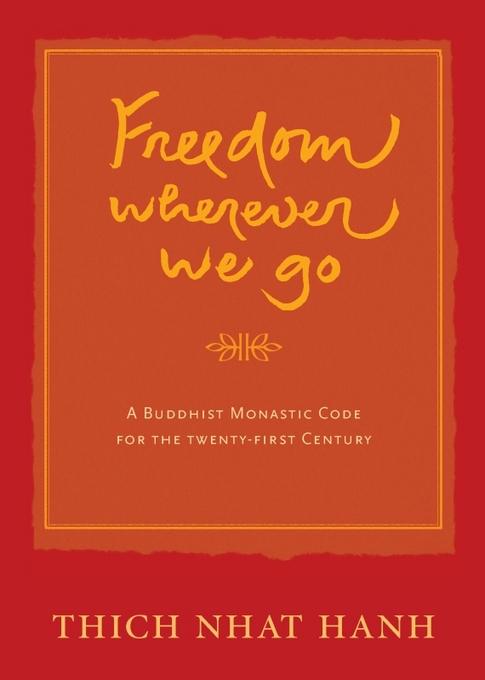
You were able to carry out these four ways of meeting with certain situations during the days that you were attacked by the mobs. As a result, you had the opportunity to touch so many people, waking them up and helping them to transform. Brothers Phap Hoi, Phap Sy and Phap Tu were dragged, throttled, suffocated and thrown into cars as if they were trashcans. Their faces were bruised, their necks and shoulders bled. Brother Phap Vinh was kicked and his body rolled down the stairs; thankfully, he did not break his leg. Brother Dong Tinh and young aspirant Binh Minh (now a novice in the Pink Lotus family) were beaten until they fainted, but never once fought back. Some people got their hands cut by the broken glass while they were destroying the monastery properties, and their wounds were cleaned and dressed by the sisters. Many of these images were recorded in video, and they touched many people deeply.
If the people want democracy and human rights, they have to know how to struggle for it, and the struggle may have to go on for many centuries. We are monastic practitioners, so we are not present in the political struggle movements, but only in the areas of culture and ethics. Back then, Siddhartha [the young prince who later became the Buddha] refused the political path in order to go on the spiritual moral path. Siddhartha also met difficulties. We practice in order to enliven a healthy culture, a way of life that has the quality of morality, loving kindness and compassion, and the best way we strive for this is to practice and share the teachings and practices with others. The society nowadays is full of social evils: corruption, power abuse, drug addiction, violence, prostitution, broken families, suicide, and reckless sexual activities. We practice and organize retreats for others to practice in order to address, prevent and cleanse those social evils, and that is the way we love our country and our people. We are citizens of an independent country, with constitution and proper laws, and we have the right to carry out this work. No one can strip off these rights from us.
During my first trip back to our country in 2005, Thay saw banners which read “cultural town,” “cultural village,” “cultural area,” etc. I was quietly happy, thinking that this was an intelligent and prompt policy of the government. Asking about it, I learned that the policy of forming those cultural towns and areas was to address the already spreading social evils such as drug addiction, prostitution, gambling, violence, etc. After being in Vietnam for a month, I was told that the government did not succeed much with those cultural towns and areas. They were only words, but not truths. The methods to control and to punish were not enough to dispel the social evils, especially when the people who carry out the control and punishment are also caught in social evils such as corruption, power abuse and treachery. Then, I saw very clearly that only true ethical training and practice could address the situation. You already know that every family that can practice the Five Mindfulness Trainings, there is harmony and happiness in that family. And no one can force us to practice the Five Mindfulness Trainings if we do not have faith in the teachings and in the precepts. As a result, in the monastic retreat at our root temple Tu Hieu (from March 7th to March 12th, 2005), I proposed a model of a village or a town in which the temple plays the leading role in ethics; the monks or nuns in that temple observe stably the precepts and mindful manners, organize retreats for adults, teenagers and children, inspire confidence in a spiritual ethical path and encourage people to receive, practice the Five Mindfulness Trainings, and to come to the temple to recite the trainings, have Dharma discussions and reflect on their own practice every half month. This is not something new. It is only the work of modernizing the old practice tradition, and the leaders, facilitators must have the proper reputation and ability to guide the youth as well as others, including the educated, business, and political people. And if we want to accomplish this, we have to begin to train a generation of new monks and nuns. That was the content of the monastic retreat at our root temple Tu Hieu, where almost one thousand young monastics attended and these Dharma talks were made into the book Building Brotherhood and Sisterhood (Xây Dựng Tình Huynh Đệ). In my mind, Bat Nha monastery at that time was already formed. Bat Nha Monastery would be the role model amongst the centers training new monastics like that.
Precepts and mindful manners are not something that restrict or lessen human freedom. Precepts and mindful manners, on the other hand, have the capacity to protect freedom. Someone who practices not drinking alcohol and not using drugs has the freedom one thousand times greater than another person who does not practice this precept, because when this latter person is caught in drunkenness and addiction, he/she has no more freedom, and he/she is ready to violate other precepts such as lying, stealing, killing others, etc. in order to get the money to buy drugs.
Everyone knows that if people do not keep the precepts, then a family with 3, 4 people still has many problems, causing each other endless suffering. If precepts and mindful manners are observed diligently, then even though it is a community of 400 people, we still can live together in harmony, trust and joy. Bat Nha Sangha proved this powerfully. Others accused us, that we did not keep the precepts, and that we slept with each other, so that they had a chance to destroy us. They even brought pornographic materials with them in order to put this accusation on us. It was one of the lowliest means of behaviors. Everyone knows that if we did not observe the precepts and mindful manners, we would not trust each other, we can never be able to live together, have such solidarity and love one another like blood relatives as we do.
At the time of the Buddha, a group of non-Buddhist practitioners also accused the Buddha’s Sangha like that. While the monks went into the city of Sravasti to beg for food, those people brought the corpse of a singer to the Jeta Monastery, buried her there and then informed the police. They spread the news that the monks in the monastery did not keep their precepts. The King Pasedena and the people in the city were very confused. Many monks did not dare to go out on alms round. The Buddha told the monks: “Do not worry. The truth will reveal itself in ten days. You should go into the city for alms round as if nothing had happened.”
The devoted follower Anathapindika heard about the situation, and he had detectives to go find out the truth and, in the end, the police were able to arrest the perpetrators. They admitted that they had done such thing because they saw the Buddha’s Sangha was too famous, the people followed the Sangha in great numbers, and they were afraid that they would lose their stand amongst the people. King Pasedena, after having had the clear evidence, punished these accusers appropriately.
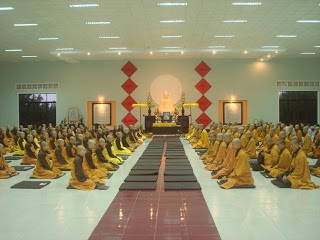
Bat Nha situation is more complicated than that of the Jeta Monastery, because in the case of Bat Nha and Phuoc Hue, the mobs were hired and the government officials hired them and worked together with them. They were two, but they were also one, whereas the king Pasedena was someone with deep reverence towards the Buddha. We also had anonymous Anathapindikas who have helped us to expose the truth, but presently, we do not have a king Pasedena to punish those who abuse power and commit treacherous acts. However, we are still lucky, because people within the country and around the world have had a chance to be in touch with the truth, and the public opinions have been on our side to speak against the unethical people. Pasedena of today is the national and international opinions. These people cannot hide their lowly behaviors and actions. They hired gangsters and had them disguise as Buddhist followers, to put up banners across the Buddha’s altar, to destroy, to assault, to provoke, hoping that you would react with violence so that they had the reason to arrest you and convict you. Thanks to your non-violent behaviors, these government officials failed completely. What kind of Buddhist followers that would assault and belittle the monastics, wear shoes into the Buddha Hall, hang banners right in front of the Buddha statue, call the monks as “Comrades, why don’t you go home to live near your mother, your father, and your wives?” The monks left their homes to be ordained, how could they have wives! Such pity is to those who were hired to be in the mob. They were paid with only 200.000 dong a day and they were directed by the police and the National Front with signs and whistles.
The truth is I could never imagine that the officials of a government would apply these unethical behaviors. Where is the money they use to hire mobs? Is it tax money from the people, used for their salary and for unwholesome activities like that? Why do they disguise to be Buddhist practitioners to destroy Buddhist practitioners, disguise to be the people to lie to and to oppress the people? Where is the revolutionary ethics? Why has the revolutionary ethics reached to such alarming bankruptcy?
Writing up to this part, Thay see clearly the reason why the policy on cultural towns and villages are not successful. How can a policy be successful when it is executed by immoral officials? If these officials are corrupted, abusing power, and when their families are victims of social evils, then how can they succeed in guiding and building cultural towns and villages? If the Ngo Dinh Diem regime (1963) failed with their policy “Gathering farmers into controlled hamlets,” then the present government also did not succeed with the policy “cultural towns and villages.”
I wonder who decided to use the term culture instead of ethics. An ideology that judges religion, believing that religion is the drug heroine, and then it would not be comfortable to use the term ethics. Then why did we talk about revolutionary ethics in the beginning of the revolution? Perhaps because the revolutionary ethics became corrupted, so the term ethics could not carry much anymore. The term culture can go in tandem with civilization. It does not carry the notion of morality and ethics. Why don’t we use the term traditional ethics standard? In the past, our ancestors were able to build a healthy ethical way of life, with the contribution of the three spiritual paths which were Confucianism, Taoism, and Buddhism. Is depending on tradition going against with new ideology? The most beautiful thing of Buddhism is the spirit of inclusiveness, not caught in dogmas and views and not in the need to eliminate other traditions. That is the meaning of “Inclusiveness,” as in the four immeasurable minds loving kindness, compassion, joy and inclusiveness. Inclusiveness (Upeksa) is non-discrimination and all-embracing. Buddhism in the past helped foster harmony in all spiritual traditions, so that the three traditions Buddhism, Taoism and Confucianism could stand together to build the country. During Thay’s return in 2005, at a talk given at the National Institute of Political Studies in Saigon, someone in the audience asked: If we take refuge in the Three Jewels [the Buddha, the Dharma and the Sangha], do we have the right to love the Party and the Nation? The question was simple but it was able to reflect the worries and hesitation of those people who wanted to return to the spiritual path that their ancestors had worked hard to develop, but they still did not dare to. Thay answered with a different question: If we take refuge and lose our freedom, not being able to love what we want to love, then why would we take refuge? The enthusiastic hand clapping resounded in the auditorium. Once we take refuge, we will love the country and the Party better and more appropriately. Our country and nation have been taught by Buddhism and enjoyed much happiness brought from the spirit of inclusiveness. Why can’t we return to our source? Why are people afraid of the spirit of inclusiveness? Why can’t people see that if we think in the direction of non-duality, openness and inclusiveness, humanity will be able to save so much flesh, blood and tear?
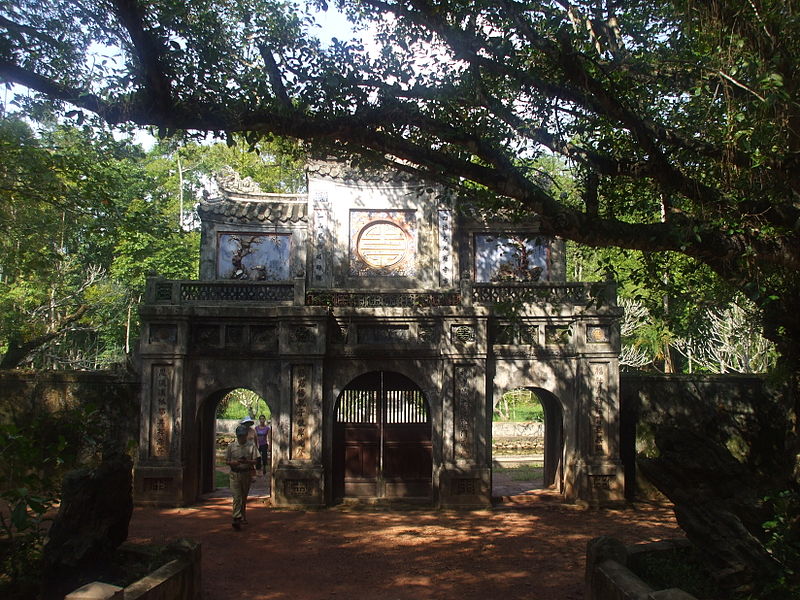
With certainty, the uncle policemen will find and read these words I write to you. This is also very good, since Thay trusts that everyone has the Buddha nature, which means the seed of understanding, compassion and loving kindness. It is of great merit to water these seeds. Many uncle policemen have been transformed by you. What if these words I am writing find their way to the eyes of those in the Central Party, those in the Central Committee for (Politburo) Making Policy of the Party (Ban Tuyên Giáo), in the high levels of the government? I think they will raise their eyebrows; they will say that these are unskillful behaviors of the ones carrying out the policy and that it is the one worm who spoils the pot of soup. But the truth is that they allowed their people to do that and then to report untruthfully and pull them along. Then they cannot blame the responsibility on others. The scholars and humanists in the country suggested that the government conducted an open investigation to bring light to the situation. The wrong doings committed in the past years – the corruptions, power abuse, trickery and treachery – must be brought to light and there must be fair punishment, so that the people in the country may again have confidence in the government system, and so that the government may continue to “govern.”
During the first trip back to our country in 2005, after 39 years of living oversea, I practiced wholeheartedly to listen to all different groups and had a relatively accurate understanding of the situation. I said: During this visit, I only have one message, which is there is nothing more valuable and noble than brotherhood and sisterhood. We can say that the most inspiring moment of the trip took place at our root temple Tu Hieu – the day that all monks and nuns from both sides of State sanctioned Buddhist Church and non-state sanctioned Monastic Sangha (Tăng Đoàn) came together to recite their precepts, after having been divided for over ten years. I remember very clearly that after the Dharma talk at Tu Dam Temple, I informed the news that both sides Buddhist Church and non-state sanctioned Monastic Sangha (Tăng Đoàn) will gather in the Root Temple to recite the Pratimoksha precepts together, and everyone cried out of happiness. The points that I suggested afterwards to the government concerning separating politics from religion, etc., they did not originate from me, but from other Venerable monks in the State sanctioned Buddhist Church. I listened to the high monks, and I acknowledged their views and aspirations. They could not speak up, so I spoke up for them, and that was all. If I met difficulties because I dared to speak up, it was because of brotherhood. Similarly, I also spoke up about the situation of Tibet. We are a nation that suffered numerous times because of the invasion from the North. Now another nation has fallen into that situation, how can we have the heart not to say anything? I spoke up for a nation, to voice a truth, knowing that it may bring difficulties, but I still had to speak up. That is conscience. That is brotherhood. Many venerable wanted to protect my Bat Nha children. They tried to raise their voice many times, even proposing to sponsor you so that you had the legal right to practice, but because the Buddhist Church did not truly have the true power of the church, so those proposals were rejected by the governmental police and Religious Affairs Committee. Our country does not yet have true religious freedom, and the government is controlling tightly the Buddhist Church machinery, and the Buddhist Church is helpless, not able to protect their own children. This is a truth clearly seen by everyone. How can it be hidden?
The police, the local government and the Religious Affairs Committee, via their actions and documents, were and are doing things against the laws of the country, the Constitution as well as the Legislation of the Religions. Therefore, we have the responsibility to help the nation, the Executive Branch and the Legislation Branch to see the wrong doings that are causing serious damages to our country and in the hearts of the people.
But I am not pessimistic. I trust that the situation will change. The reason is that you are present there. The Vietnamese youth have begun to see the truth and to know what they are hoping for their motherland. The Vietnamese young people, whether they are studying within the country or overseas, are able to realize that Vietnam need more democracy, more citizen rights and more human rights; only then our people may have the opportunity to contribute to our country and bring our country to an upward direction. In this time period, a country cannot shut itself out of the rest of the world. It has to open doors and co-operate with other nations. And it has to obey international laws, including respecting human rights. My Bat Nha children have chosen the path of non-violent struggle, and you have invested all of your faith to do that. Your non-hating hearts, your fraternal heart have touched people deeply. Not only the Buddhists inside and outside of the country are supporting you, but people in other circles are also supporting you. You are not alone on your path. Even though the path is difficult, it is very beautiful. I am very happy to see that I have been continued by you. Amongst us, there are those who are still very young, but our hearts are always gentle and pure. We go as a river. We learn as we go, and we will also be continued by the generations following behind us. We have a path – a very bright path that our ancestors had discovered.
I read very carefully all of the letters you sent to me. Sister Don Nghiem said: “Bat Nha of yesterday has become rain, falling onto the ground, sprouting the Bodhi seed (of Understanding and Love).” Sister Ao Nghiem said: “On our path, I have found brothers and sisters with the same aspiration. Regardless of what may happen to me, I will not feel ashamed to my ancestors and friends in the five continents.”
On the day the Venerables in Lam Dong province came to recite their precepts at Phuoc Hue Temple, they all cried because they felt so moved for your difficult situation, and all of you had a chance to cry with them. That moment was very beautiful. That was a Dharma rain. History recorded that moment.
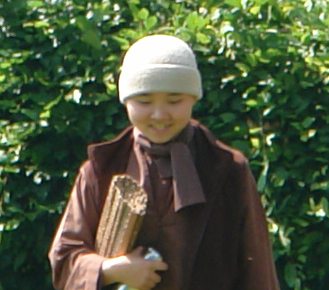
Sister Don Nghiem is one of the White Lotuses Family, barely eighteen years old. The letter she sent to me had the value of an insight gatha, and she herself did not even know it. Bat Nha to her is the months and years of happiness, because there, she was able to live in her aspiration and in brotherhood and sisterhood. Bat Nha is also the streams of tear, rolling down during the days of attack and destruction. Bat Nha has become a legend, a fairy tale, but Bat Nha is not lost, it has only become rain. The Bat Nha rain has fallen to the ground and sprouted the seed of Bodhi, the seed of Understanding and Love in Sister Don Nghiem’s heart, in your hearts and in the hearts of many other young people. These are the indestructible Diamond seeds. No fire may burn it. Bat Nha will be reborn again in new forms, because its Bodhi seed is present everywhere. One must be able to see Bat Nha in its signless forms and its multi-forms. Sister Don Nghiem has been able to see it, so she is not suffering and worried anymore. Bat Nha of Sister Don Nghiem will be everlasting. With that insight, people like Sister Don Nghiem will never step back or give up. Therefore, Thay is never pessimistic. Thay trusts in the youth of Vietnam. Thay does not need to advise you to do this and that. Right within your own situation and that of the country, you yourself know what you need to do, and with certainty, you will accomplish your aspiration. This is because your Mind of Understanding and Love is present. Therefore, Thay has trust and confidence in you.
On December 6th, 2009, from Plum Village via the internet, I had the opportunity to give a talk to the Religion Summit Conference in Melbourne, Australia. I shared with religious leaders who were present at the conference about the Buddhist vision on the global spiritual ethics. I talked about the newly revised Five Mindfulness Trainings as the path humanity may apply in order to exit the difficult situation, saving our planet earth and bringing peace and happiness to the world. The revised Five Mindfulness Trainings are the fruit of practice of the Sangha over eight months. It is the path founded by the Buddha. It is the Buddhist contribution to humanity, extremely necessary in this globalization period. We have a path, we have the confidence, we have each other as a Sangha, and thus we do not need to worry anymore. Just as young Brother Phap Dai said: “We know that besides our practice, we do not need to worry about anything else. We vow to practice better, so that we do not disappoint our Teacher and Ancestors.” Hearing you say things like that, I know that I have faith in you.
Your Bat Nha Thay (as some of you have called me!)
Nhất Hạnh


Share Your Reflections